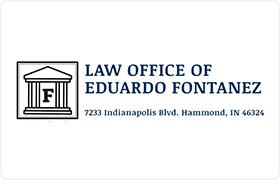Hobart RICO Act Lawyer, Indiana
Sponsored Law Firm
-
 x
x

Click For More Info:
-
Law Office of Eduardo Fontanez
7233 Indianapolis Blvd Hammond, IN 46324» view mapCriminal Defense, Divorce & Family Law Former Judge & Former Deputy Prosecutor
I hope we can resolve any issue you may need. Here at the Law Office of Eduardo Fontanez, are focused on providing high-quality service and customer satisfaction.
800-697-7560
Not enough matches for Hobart RICO Act lawyer.
Below are all Hobart Criminal lawyers.
Edward John Wartman
✓ VERIFIEDEd was born and raised in Calumet City, Illinois graduating from Quigley South High School in Chicago in 1988. He graduated from Northwestern Univers... (more)
Aaron L. Robbins
✓ VERIFIEDAt Robbins and Seville, LLC, we specialize in providing 21st-century solutions to our clients' legal challenges. This includes utilizing cutting-edge... (more)
Paul Stracci
✓ VERIFIEDPaul Stracci is a uniquely experienced criminal trial attorney who has had remarkable success in the courtroom. He successfully defended his first mu... (more)
Stephen Charles Bower
Samuel George Vazanellis
Alison Louise Benjamin
FREE CONSULTATION
CONTACT Eduardo Fontanez Hammond, IN
Eduardo Fontanez Hammond, IN Practice AreasExpertise
Practice AreasExpertise



